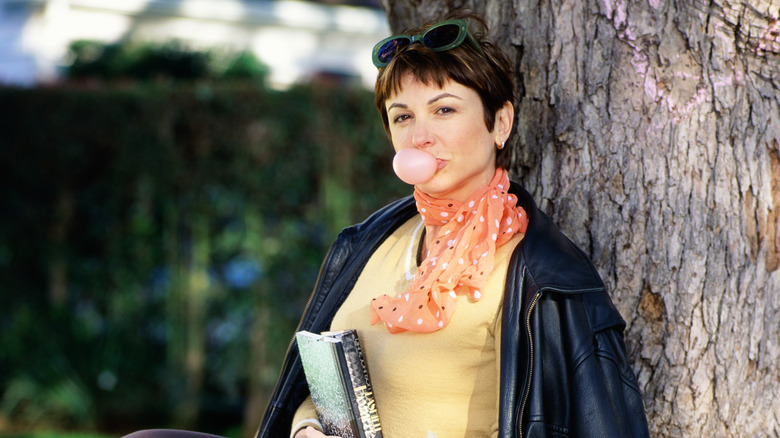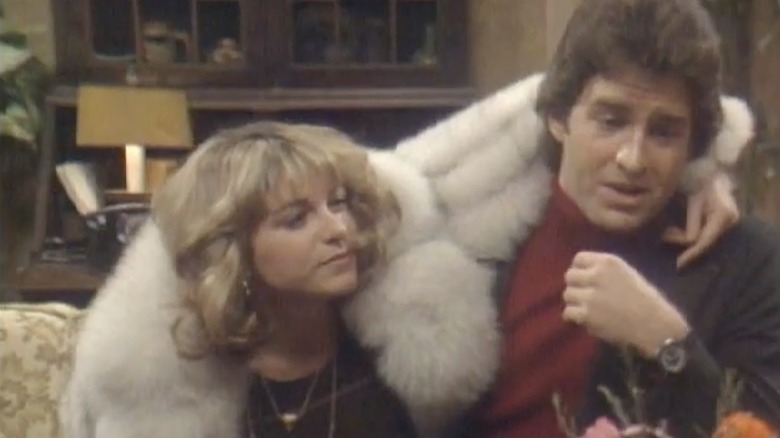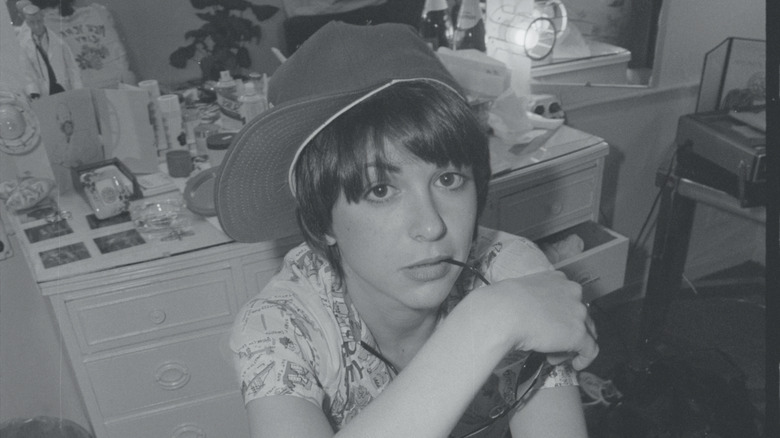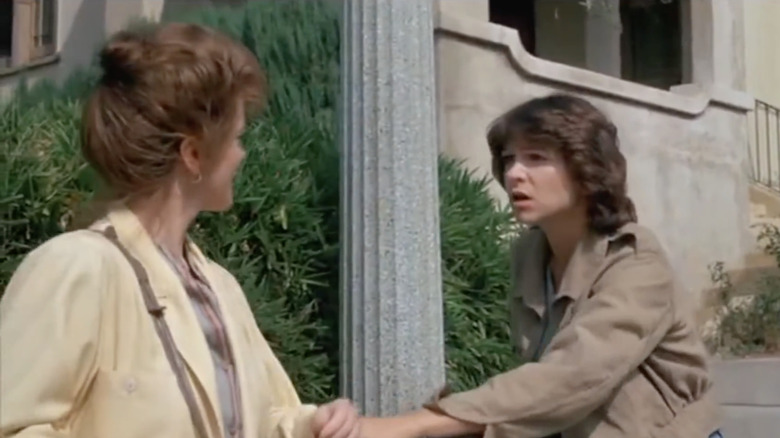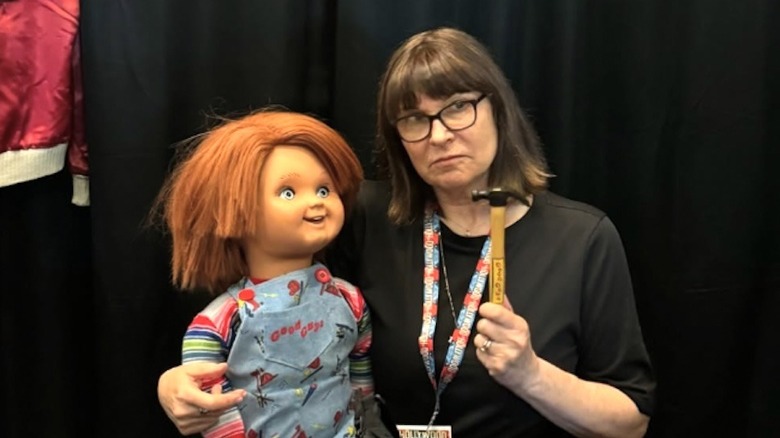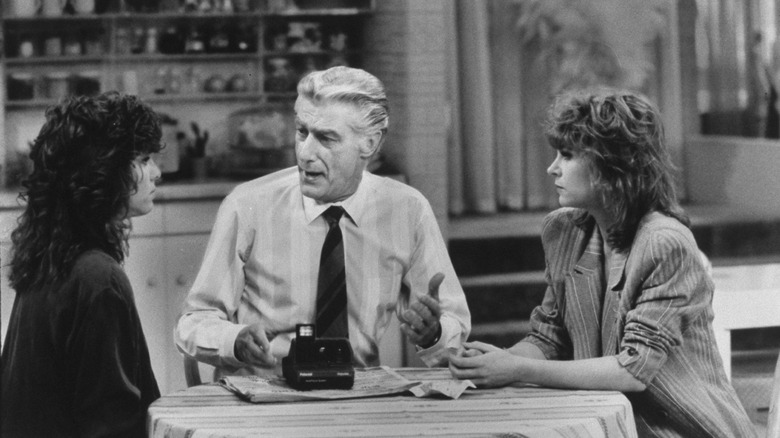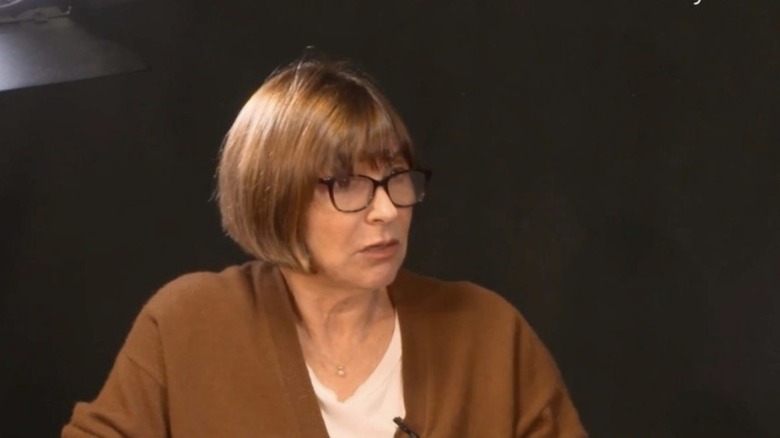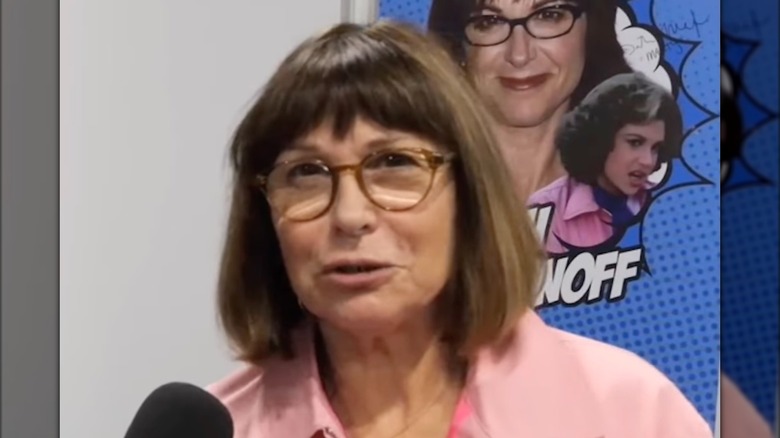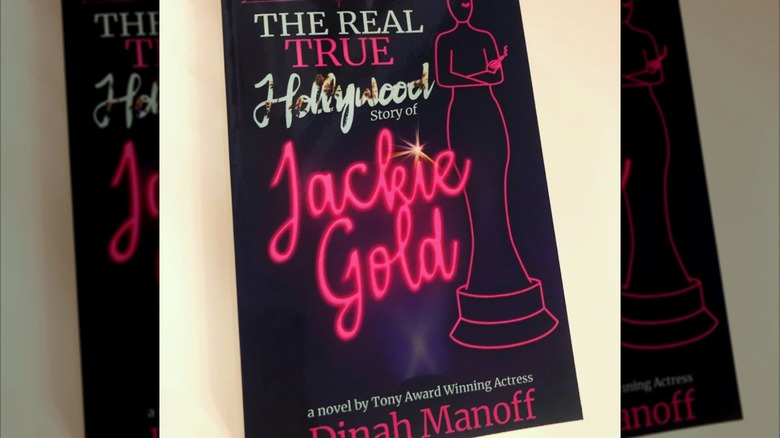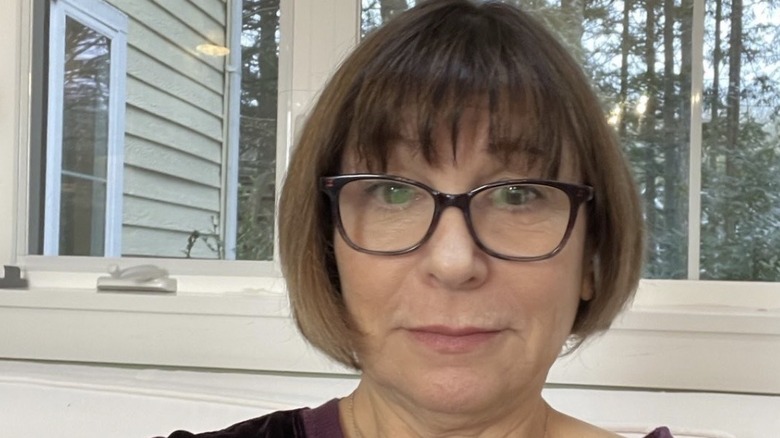Whatever Happened To Marty From Grease?
Based on Broadway hit, the movie musical "Grease" dominated the box office during the summer of 1978. With a modest budget of just $6 million, "Grease" raked in nearly $400 million at the worldwide box office, the highest-grossing movie musical of the 20th century. Much of that success had to do with the charisma of stars John Travolta and Olivia Newton John, and a killer soundtrack full of hits that percolated throughout Top 40 radio.
With Trvaolta as leather-clad greaser Danny Zuko and Newton-John as Aussie good girl Sandy Olsson, the teenagers were bolstered by their respective crews: Danny joined by the T-Birds, while Sandy found friendship with the Pink Ladies: Rizzo (Stockard Channing), Jan (Jamie Donnelly), Frenchy (Didi Conn) and Marty (Dinah Manoff). Nearly five decades later, fans may wonder what became of the actors who portrayed these beloved characters, pondering whatever happened to Rizzo, and what became of Frenchy?
As for Manoff, "Grease" may be the project for which she's best remembered, but the truth is that movie role was just one brief stop in a jam-packed and hugely successful Hollywood career — until she decided to make a break from Tinseltown and embrace a quieter life away from the glare of the spotlight. To learn more about this talented actor, read on to find out whatever happened to Dinah Manoff, aka Marty from "Grease."
She appeared in hit TV comedy Soap
Prior to being cast as Marty in "Grease," Manoff had already amassed some screen credits, including the TV sitcom "Welcome Back, Kotter," and the feature film "Raid on Entebbe." For Manoff, showbiz was literally in her blood; her mother is actor Lee Grant (known for such films as "Shampoo," "Airport 77," and "Defending Your Life"), while her father, the late Arnold Manoff, was a playwright.
After "Grease," audiences next saw Manoff display her flair for comedy in sitcom soap opera spoof "Soap" as Elaine Lefkowitz, girlfriend and then wife of Danny Dallas (Ted Wass). As Manoff told the "Literary Licence Podcast," she was already a fan of the show, and found it somewhat surreal to become part of the "Soap" storyline. "It was like walking into the pages of a book that you had been reading," Manoff said of joining the show in its second season. "It was an iconic show, and we were all watching it," she added, "so to get a job on it was, like, crazy."
Her experience on the show would pay huge dividends later in her career, with a future project involving the series' producer, Susan Harris, and star Richard Mulligan, who played her "Soap" father-in-law. During this period, Manoff also demonstrated her facility with both drama and comedy. Her versatility was evident in the roles she nabbed, ranging from a 1979 guest spot in wacky sitcom "Mork & Mindy" to a supporting role as a suicidal teenager in Oscar-winning 1980 drama "Ordinary People."
She starred on Broadway and won a Tony Award
Manoff's acting career was on the rise when she landed a role that would prove pivotal in her career: Libby, the protagonist in Neil Simon's "I Ought to Be in Pictures," playing a sassy young woman, with big dreams of becoming a movie star, who tracks down her estranged father in Hollywood. The play had a respectable, if modest, run, from April 1980 until closing the following January. Still, Manoff made her mark on Broadway. "Honestly, I was the luckiest young actress in the world — at the time I just didn't know it," Manoff said when appearing on the "Literary License Podcast." As she revealed, she believed that one reason she was cast was her familiarity with Simon's style of dialogue, having run lines with her mother when she'd appeared in two of Simon's plays. "So that language and that rhythm was inherent to me — I could sing it," she explained.
Not only did "I Ought to Be in Pictures" mark Manoff's Broadway debut, it also brought her a Tony Award, for Best Performance by an Actress in a Featured Role. "That was a big surprise," Manoff admitted, recalling that experiencing such extreme success so quickly, while in her early 20s, was daunting. "It was almost too much for me to take in at that time in my life," she said, describing feeling "body adjacent" during that time, as if she was watching it all happen to somebody else.
Dinah Manoff brought her award-winning Broadway performance to the silver screen
When a deal was struck to bring Neil Simon's "I Ought to Be in Pictures" to the big screen, Manoff was hired to reprise her Tony Award-winning role in the 1982 film version. Manoff won raves for her performance; a review running in Variety, for example, praised the film's casting, noting that "Manoff [was] outstanding in avoiding direct sentimentality in the showy central role."
For Manoff, whose film experience to that point had been in small roles, starring opposite film legends Walter Matthau and Ann-Margret was daunting. "It wasn't fun," Manoff told the "Literary License Podcast." "It was suddenly, for me, at least in my mind, I felt so much pressure to be brilliant." While she'd felt free and uninhibited onstage, that was not the case when she faced a movie camera. "I found real freedom in acting onstage, that when it came to that camera being on and those people watching, and zoomed in like that, I didn't have it," she said. "It was terrifying to me."
Another factor that she found disorienting was that director Herbert Ross — who'd also directed her on Broadway — had decided to make the film darker than the play, emphasizing its dramatic elements, while minimizing the comedy. "So that also put a weight onto the material," Manoff observed, admitting she's not a fan of her performance in that film. "With the combination of my anxiety and that kind of weight, sparks did not fly, in my opinion," she said.
She was featured in several movies and TV series during the 1980s — and became Chucky's first victim
"I Ought to Be in Pictures" was far from the blockbuster that "Grease" had been, but it served as a big stepping stone in Manoff's Hollywood career. This included a few made-for-TV movies ("Celebrity" and "Flight 90: Disaster on the Potomac") and guest spots in various TV shows, including "Night Court," "Cagney & Lacey," and "Murder, She Wrote." She also returned to Broadway, starring in the short-lived 1985 musical "Leader of the Pack," which closed after less than three months.
Another of Manoff's more memorable roles came during this period, in the 1988 slasher flick "Child's Play." That film launched a successful franchise centered upon murderous doll named Chucky — whose very first onscreen victim was played by Manoff. "That was a fun shoot," Manoff told the "Literary License Podcast" of being flung out a window by the homicidal toy.
At the time, she'd also been up for a role in another movie, "The Bloodhounds of Broadway," a high-profile, yet low-paying, indie that had attracted an all-star cast headlined by pop-queen-turned-movie star Madonna. "It paid nothing, but was like, super prestigious," Manoff recalled in an interview with Slasher Scotty. She regretfully chose a paycheck over prestige, and took the higher-paying "Child's Play" role. "Literally nobody saw 'The Bloodhounds of Broadway,' and 'Child's Play' was No. 1 at the box office," she added. "It was like, 'Oh boy, I just have no instinct for this business at all.'"
Dinah Manoff starred in Golden Girls spinoff 'Empty Nest'
The same year that "Child's Play" was released, Manoff was cast in a TV series that would become familiar to viewers for the nest few years, "Empty Nest." A spinoff of megahit sitcom "The Golden Girls," "Empty Nest" focused on a widowed doctor (former "Soap" star Richard Mulligan) whose two adult daughters (Kristy McNichol and Manoff) move in with him after their marriages failed.
As Manoff recalled when speaking with the "Literary Licence Podcast," she almost didn't get the part because the show's producers — who'd worked with her a decade earlier on "Soap" — had some worries. "They were a little concerned about my self-discipline if the show ran a long time, and me showing up, because in the old 'Soap' days I was still quite a party girl," she said.
As it turned out, "Empty Nest" did enjoy a long and successful run, continuing for seven seasons until ending in 1995. In the decade between "Soap" and "Empty Nest," Manoff had experienced her fair share of the peaks and valleys of an actor's career, and never took its success for granted. "Once you have been hot and cold, you get real appreciative when you got a place to go every day with decent material, a paycheck to come in and nice people to work with," Manoff told the Los Angeles Times in 1992. "I am so bloody grateful that this show keeps running."
She embarked on a parallel career as a director during the 1990s
While starring in "Empty Nest," Manoff grew eager to develop her skills beyond acting. In 1992, she was given a shot at directing an episode — which went well enough that she ultimately directed seven "Empty Nest" episodes. "I was so grateful to be allowed to direct," Manoff told Empty Nest Online, recalling that producers felt that she could use another outlet to "channel my restless energy. I loved directing 'Empty Nest.'" She also wrote two episodes of "Empty Nest," one of which came from pitching the producers a story idea that she and her friend, fellow actor Valerie Landsburg, had come up with. However, Manoff confessed that her writing credit on the episode was a bit dubious. "Unfortunately, the writers didn't like our version and completely rewrote the episode," she recalled. "Looking back on it, they were probably right."
After the series ended its run in 1995, Manoff continued to direct episodic television throughout the rest of the decade. This included the series "Sister, Sister," "Minor Adjustments," "Brother's Keeper" (directing three episodes of that one), "Movie Stars," and an episode of beloved sitcom "Sabrina the Teenage Witch."
She exited Hollywood and moved to a small town in the Pacific Northwest to focus on teaching and writing
After "Empty Nest," Manoff continued to appear as a TV guest star, but her priorities shifted after she got married in the late 1990s, and she and husband Arthur Mortell became parents. That led Manoff and her family to move from L.A. to Bainbridge Island, a small community in Washington state. "Well, when my twins turned three and my oldest turned nine, my wonderful husband and I decided it was time to get out of Dodge, aka Los Angeles," she told Empty Nest Online. "We moved to an island near Seattle with a very progressive and creative community. So now I am raising my kids, riding my horse, writing a novel, teaching acting, cooking vegetable soup from my garden ... wait ... who am I?"
It was in her new home in the Pacific Northwest that Manoff embraced a new role, teaching acting to others — and quickly realized that role was one she was born to play. "I really fell in love with teaching," Manoff told Bainbridgeisland.com. "I thought, 'Wow, this is my calling.' I love being able to help people express themselves in ways they didn't know they were able to, and laugh at themselves and find their creative juices."
Teaching acting at a women's prison helped her heal from a tragic loss
In 2017, Manoff experienced an unspeakable tragedy when her 19-year-old son, Dashiell Mortell, was killed in a car accident. Like his mother, he displayed talent as an actor, appearing in productions for a local theater, Bainbridge Performing Arts. Manoff was paralyzed with grief, and found solace in an unusual place. "I was gutted and non-functional, and I did not want to be a person whose life became defined by grief, and by tragedy. I was carrying the emotion but I wanted to survive it, and thrive again," she said while appearing on "The Alison Arngrim Show," "And I knew that the one way I could save myself was to be of service somehow."
It was that desire to serve that led her to contact authorities at a women's prison, Purdy Corrections Center for Women in nearby Gig Harbor, to pitch an idea she'd had about teaching acting and improv to inmates. The educational director at the prison loved the idea. "It was really good for me," she said, explaining how the process of working with the female inmates proved to be healing for her. "For that time, when I was in such deep grief from losing Dashiell, for two hours a week I would laugh ... For two hours a week, I was okay."
The longevity of 'Grease' led Dinah Manoff to fan conventions
While "Empty Nest" is certainly Manoff's longest and, in many ways, most defining screen credit, she continues to be remembered by fans for her relatively small role in "Grease." As a result of the film's enduring popularity, and her role in it, Manoff is sought after to appear at fan conventions, where she poses for photos, signs autographs, and participates in Q & As with attendees. In October 2025, she took to Facebook to announce her appearance at a fan event in Bakersfield, California. "'Grease' fans!" she wrote. "Come out and meet a couple of Pink Ladies, T-birds and others from the movie."
While she continues to reminisce about "Grease," it was her "Empty Nest" role (which also included two appearances on "The Golden Girls") that led her to appear at the inaugural Golden Con: Thank You for Being a Fan convention in 2022. "The fact is I have many things to share about that time," she said in a statement ahead of the convention. "And I'm going to share it all from the stage."
She wrote a novel based on her child actor past
While appearing at Golden Con, Manoff had a specific agenda beyond sharing Bea Arthur anecdotes. As it turned out, she had a book to promote, her quasi-autobiographical novel, "The Real True Hollywood Story of Jackie Gold," which was published in 2021. "It's not my story. But it's based on the experiences I've had and the people I know," she told Golden Con of her debut novel. "It is a very showbiz tale," Manoff explained when discussing the book in a 2021 interview with Matt Browning Books, shortly after its release. "Jackie Gold is a product of show business ... her father runs a big motion picture studio, and her boyfriend is People's Sexiest Man Alive," she continued.
While the story is a fictional one, a lot of what takes place in the book was inspired by experiences she'd either had herself or heard about during her years as a Hollywood actor. "They are compilations from many different situations in my life in show business," she told CITL CKSA, quick to point out that she was never as big a star as protagonist Jackie Gold. "Though I knew all the big stars in Hollywood at one time," she added. "I think Jackie is like a compilation of Demi Moore, and Lindsay Lohan, and Britney Spears, and Tori Spelling. All those girls that the paparazzi slathered over."
Dinah Madoff wrote a political play
Having unleashed her inner writer with "The True Hollywood Story of Jackie Gold," Manoff didn't stop there. She followed that up by writing a play, titled "The Messenger," which was produced onstage in Bainbridge Island during the summer of 2025. "Bainbridge and Seattle folks, I'm so excited to share a play-in-progess I've been writing for the past two years: 'The Messenger,' a timely play about our tumultuous political times," she wrote in a post she shared via Instagram.
Staged at Bainbridge Performing Arts, the play featured another famous Bainbridge Island refugee from Hollywood, Elizabeth Mitchell, whose numerous screen credits include "Lost," "V," "Once Upon a Time," "The Expanse," and "Outer Banks." Mitchell portrayed the play's protagonist, a terminally ill woman named Thea, who comes into conflict with the new caretaker who's been assigned to her, who hold very differing political views. Meanwhile, she also had another project taking up her time: acting in the audiobook version of "Jackie Gold." "I'm excited and ever so grateful to the cast and audio engineers who helped bring Jackie Gold to life!" she wrote on Instagram.
